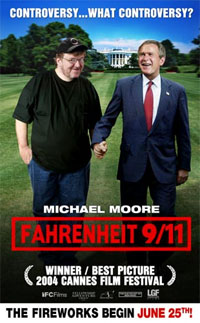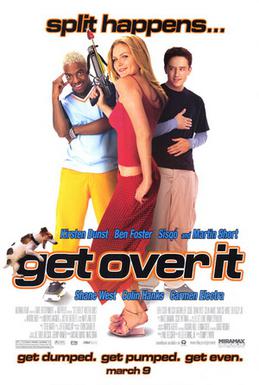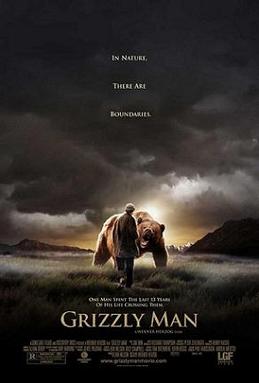Miramax LLC, also known as Miramax Films, is an American film and television production and distribution company founded on December 19, 1979, by Bob and Harvey Weinstein, and based in Los Angeles, California.

The Blue Planet is a British nature documentary series created and co-produced by the BBC and Discovery Channel. It premiered on 12 September 2001 in the United Kingdom. It is narrated by David Attenborough.

Fahrenheit 9/11 is a 2004 American documentary film directed, written by, and starring left-wing filmmaker, director, political commentator and activist Michael Moore. The subjects of the film are the presidency of George W. Bush, the Iraq War, and the media's coverage of the war. In the film, Moore claims that American corporate media were cheerleaders for the 2003 invasion of Iraq, and did not provide an accurate or objective analysis of the rationale for the war and the resulting casualties there.
Dimension Films is an American film and television production and distribution company owned by Lantern Entertainment. It was formerly used as Harvey and Bob Weinstein's label within Miramax, which was acquired by The Walt Disney Company on June 30, 1993, and it later became a part of The Weinstein Company (TWC) from 2005 until 2018. The company produces and releases independent films and genre titles, specifically horror and science fiction films.
Andy Byatt is an English wildlife documentary film producer for the BBC Natural History Unit (NHU) in Bristol. His expertise is in the creation of underwater wildlife films. He co-directed Deep Blue, a natural history feature film about the oceans narrated by Michael Gambon. This film was largely put together with highlights from the NHU's internationally acclaimed series, The Blue Planet, of which Byatt was one of the producers, along with Alastair Fothergill and Martha Holmes. His most recent project is Planet Earth an 11-part High-definition TV wildlife series first aired in March 2006.
Project Greenlight is an American documentary television series focusing on first-time filmmakers being given the chance to direct a feature film. It was created by Alex Keledjian, developed by Eli Holzman and produced by Ben Affleck, Matt Damon, Sean Bailey, and Chris Moore through their production company LivePlanet, along with Miramax Films. Project Greenlight first aired on HBO for two seasons before moving to Bravo for season three in 2005. The series returned in 2015 for a fourth season airing on HBO. On July 26, 2016, the series was canceled. In May 2021, HBO Max picked up the series with an 8-episode order and will be produced by Issa Rae through her production company Hoorae Media. The revival titled Project Greenlight: A New Generation premiered on July 13, 2023.

George Richard Ian Howe, known professionally as George Fenton, is an English composer. Best known for his work writing film scores and music for television, he has received five Academy Award nominations, several Ivor Novello, BAFTA, Golden Globe, Emmy and BMI Awards, and a Classic BRIT. He is one of 18 songwriters and composers to have been made a Fellow of the Ivors Academy.

Get Over It is a 2001 American teen comedy film loosely based on William Shakespeare's A Midsummer Night's Dream about a high school senior who desperately tries to win back his ex-girlfriend by joining the school play she and her new boyfriend are performing in, against the advice of friends. The film was directed by Tommy O'Haver for Miramax Films and written by R. Lee Fleming Jr. The film was released on March 9, 2001, and stars Ben Foster, Kirsten Dunst, Melissa Sagemiller, Sisqó, Shane West, Colin Hanks, Zoe Saldana, Mila Kunis, Swoosie Kurtz, Ed Begley Jr., Carmen Electra and Martin Short. The film grossed $19.9 million against a budget of $22 million and received mixed reviews.

Grizzly Man is a 2005 American documentary film by German director Werner Herzog. It chronicles the life and death of bear enthusiast Timothy Treadwell and the death of his girlfriend Amie Huguenard at Katmai National Park, Alaska. The film includes some of Treadwell's own footage of his interactions with brown bears before 2003, and of interviews with people who knew or were involved with Treadwell, in addition to those of professionals who deal with wild bears.

A nature documentary or wildlife documentary is a genre of documentary film or series about animals, plants, or other non-human living creatures, usually concentrating on video taken in their natural habitat but also often including footage of trained and captive animals. Sometimes they are about wildlife or ecosystems in relationship to human beings. Such programmes are most frequently made for television, particularly for public broadcasting channels, but some are also made for the cinema medium. The proliferation of this genre occurred almost simultaneously alongside the production of similar television series which is distributed across the world.

Planet Earth is a 2006 British television series produced by the BBC Natural History Unit. Five years in the making, it was the most expensive nature documentary series ever commissioned by the BBC and also the first to be filmed in high definition. The series received multiple awards, including four Emmy Awards, a Peabody Award, and an award from the Royal Television Society.

Neil Nightingale is a British freelance wildlife filmmaker, executive producer and creative consultant with over 35 years experience at the BBC. From 2009 to 2018 he was the creative director of BBC Earth, BBC Worldwide's global brand for all BBC nature and science content.

Alastair David William Fothergill is a British producer of nature documentaries for television and cinema. He is the series producer of the series The Blue Planet (2001), Planet Earth (2006) and the co-director of the associated feature films Deep Blue and Earth.

Earth is a 2007 nature wildlife documentary film which depicts the diversity of wild habitats and creatures across the planet. The film begins in the Arctic in January of one year and moves southward, concluding in Antarctica in the December of the same year. Along the way, it features the journeys made by three particular species—the polar bear, African bush elephant and humpback whale—to highlight the threats to their survival in the face of rapid environmental change. A companion piece and a sequel to the 2006 BBC/Discovery/NHK/CBC television series Planet Earth, the film uses many of the same sequences, though most are edited differently, and features previously unseen footage not seen on TV.
Martha Holmes is a BAFTA Award-winning BBC Television producer and writer known for her wildlife documentaries.
Disneynature is an independent film studio that specializes in the production of nature documentary films for Walt Disney Studios, a division of Disney Entertainment, which is owned by The Walt Disney Company. The production company was founded on April 21, 2008, and is headquartered in Paris, France.

Frozen Planet is a 2011 British nature documentary series, co-produced by the BBC ZDF and The Open University. It was filmed by the BBC Natural History Unit. The production team, which includes executive producer Alastair Fothergill and series producer Vanessa Berlowitz, were previously responsible for the award-winning series The Blue Planet (2001) and Planet Earth (2006), and Frozen Planet is billed as a sequel of sorts. David Attenborough returns as narrator. It is distributed under licence by the BBC in other countries, Discovery Channel for North America, ZDF for Germany, Antena 3 for Spain and Skai TV for Greece.
Planet Earth is a television and film documentary franchise produced and broadcast by the BBC. The franchise began in 2001 with the success of The Blue Planet. As of 2017, The Blue Planet has spawned 5 series and one feature film.

Whitney is a 2018 documentary film about the American singer and actress Whitney Houston. The film was directed by Kevin Macdonald and produced by Simon Chinn, Jonathan Chinn and Lisa Erspamer. Whitney was screened out of competition at the world premiere as part of the 2018 Cannes Film Festival on 16 May 2018 with a cinema release on 6 July 2018. The film was also released on home media where it debuted at number one on the UK Official Music Video Chart. The film received positive reviews from critics and audiences and grossed $4.7 million worldwide at the box office. In December 2018, Whitney was nominated at the 61st Grammy Awards for Best Music Film.












